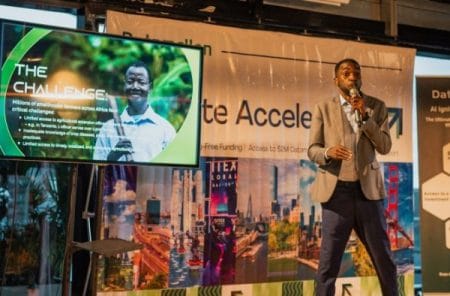Welcome to the world of Artificial Intelligence (AI), a transformative technology reshaping industries and lives across Africa. If you’re new to AI, this guide will walk you through what AI is, how it works, and why it matters for Africa. With practical examples and free resources, you’ll discover how AI is tackling African challenges in agriculture, healthcare, education, and more. Let’s dive in and explore how you can start your AI journey!
What Is Artificial Intelligence?
Artificial Intelligence is when computers perform tasks that typically require human intelligence, such as learning, problem-solving, or decision-making. Think of AI as a smart assistant that can analyze data, recognize patterns, and make predictions.
Key AI Concepts for Beginners
- Machine Learning (ML): A type of AI where computers learn from data to make decisions. For example, ML can predict crop yields based on weather data.
- Neural Networks: AI models inspired by the human brain, used in tasks like image recognition (e.g., identifying diseases in medical scans).
- Natural Language Processing (NLP): AI that understands and generates human language, powering chatbots in languages like Swahili or Yoruba.
- Computer Vision: AI that interprets images or videos, such as detecting pests on crops.
How Does AI Work?
AI systems are trained on data. For instance:
- Data Input: A dataset of African weather patterns.
- Training: The AI learns to predict rainfall by finding patterns in the data.
- Output: The AI provides forecasts to help farmers plan planting.
Why AI Matters for Africa
Africa faces unique challenges—food security, healthcare access, education gaps—but also has immense opportunities. AI is already making a difference by addressing these issues with solutions tailored to African contexts. Here’s why AI is a game-changer:
- Scalability: AI can serve millions, from rural farmers to urban students, at low cost.
- Local Relevance: AI can be adapted to African languages, cultures, and needs.
- Innovation Hub: Africa’s young, tech-savvy population is driving AI adoption, with startups and communities like Zindi and Masakhane leading the way.
AI Applications in Africa: Real-World Examples
Let’s explore how AI is transforming key sectors in Africa, with examples that show its impact and potential.
1. Agriculture: Boosting Food Security
Agriculture employs over 50% of Africa’s workforce, but challenges like pests, droughts, and low yields persist. AI is helping farmers work smarter.
- Example: In Kenya, the startup PlantVillage uses AI-powered computer vision to detect crop diseases. Farmers upload photos of plants via smartphones, and the AI identifies issues like maize blight, offering treatment advice.
- Impact: Farmers increase yields and reduce losses, supporting food security.
- Get Started: Explore datasets on Zindi to try building a crop prediction model.
2. Healthcare: Improving Access and Outcomes
With limited doctors in many African regions, AI is bridging gaps in healthcare delivery.
- Example: In Malawi, AI models analyze medical images to detect malaria early. Tools like DeepMind’s algorithms help clinicians prioritize urgent cases, even in remote clinics.
- Impact: Faster diagnoses save lives and reduce healthcare costs.
- Get Started: Check out free courses on Google’s AI Essentials to learn about AI in healthcare.
3. Education: Personalizing Learning
Africa’s education systems face challenges like teacher shortages and diverse languages. AI is creating inclusive, scalable solutions.
- Example: In Nigeria, Ulesson uses AI to deliver personalized learning content to students via mobile apps, adapting to their pace and needs in subjects like math.
- Impact: Students in rural areas access quality education, leveling the playing field.
- Get Started: Experiment with AI chatbots using Hugging Face to create educational tools.
4. Financial Inclusion: Empowering the Unbanked
Over 40% of Africans lack bank accounts, but AI is enabling access to financial services.
- Example: In Ghana, M-KOPA uses AI to assess creditworthiness for pay-as-you-go solar systems, helping unbanked households afford clean energy.
- Impact: Families gain access to electricity and financial tools, boosting economic growth.
- Get Started: Learn about AI in finance with Edureka’s free AI courses.
5. Language Inclusion: Supporting African Languages
Africa has over 2,000 languages, many underrepresented in tech. AI is making digital tools accessible in local languages.
- Example: Masakhane, a pan-African NLP community, builds AI models for languages like Yoruba and Amharic, enabling chatbots and translation tools.
- Impact: Digital services reach more people, preserving cultural diversity.
- Get Started: Contribute to Masakhane’s open-source projects on GitHub.
How to Get Started with AI in Africa
Ready to explore AI? Here’s a simple roadmap for beginners, with free tools and African-focused resources.
Step 1: Learn the Basics
- Free Courses:
- University of Johannesburg’s AI in the 4IR MOOC (uj.ac.za): A free course on AI’s role in Africa’s Fourth Industrial Revolution.
- Google’s AI Essentials (grow.google): A beginner-friendly introduction to AI concepts.
- Brains for AI Africa: Free AI courses for African youth.
- Tip: Start with short, interactive modules to build confidence.
Step 2: Experiment with Tools
- Google Colab (colab.research.google.com): A free cloud platform to run AI code without a powerful computer. Try a simple Python script to predict rainfall.
- Kaggle: Access free datasets and tutorials, including African datasets like health records or market trends.
- Hugging Face: Build NLP models for African languages with free tools and pre-trained models.
Step 3: Join African AI Communities
- Zindi: Participate in data science competitions, like predicting solar energy output, to learn and network.
- Deep Learning Indaba: Attend workshops or join local IndabaX events across Africa.
- Masakhane: Contribute to NLP projects for African languages, even as a beginner.
Step 4: Build a Simple Project
Try a beginner-friendly project to apply your skills:
- Idea: Create a chatbot that answers farming questions in Swahili using Rasa.
- Steps:
- Follow a Hugging Face tutorial to set up a basic chatbot.
- Use Masakhane’s Swahili dataset to train it.
- Share your project on GitHub to get feedback.
Tips for Success
- Start Small: Focus on one concept, like machine learning, before diving into complex topics.
- Use Free Resources: Leverage platforms like Google Colab and Kaggle to avoid costs.
- Connect Locally: Join African AI communities to find mentors and collaborators.
- Think Ethically: Ensure your projects respect privacy and avoid bias, especially in sensitive areas like healthcare.
Why You Should Start Now
AI is shaping Africa’s future, from smart farming to inclusive education. As a beginner, you can contribute to this revolution by learning, experimenting, and collaborating. Africa’s AI ecosystem is growing, with opportunities for everyone—students, developers, or enthusiasts. By starting today, you’ll gain skills, build a portfolio, and make a difference in your community.
Ready to take the first step? Enroll in a free course, join a Zindi competition, or explore Masakhane’s projects. Share your journey with iAfrica, and let’s build Africa’s AI future together!
The information provided is accurate as of April 30, 2025. Program availability and details may change, so verify with the respective platforms before enrolling. iAfrica is not responsible for inaccuracies or changes in offerings.






